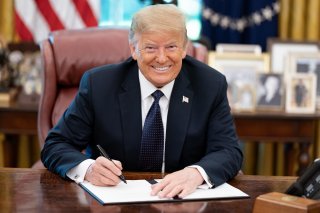U.S. Presidents Who Went to War: 5 Best in U.S. History
Does this man make the cut?
Polk and the Mexican War:
Like McKinley’s war, Polk’s was a product of America’s expansionist zeal. Americans of the 1840s thrilled to prospects that their nation could become a transcontinental power, facing two oceans and positioned to play a major role on the global scene. They wanted that dream fulfilled, and Polk set out to do it for them. After acquiring vast portions of Oregon Territory, previously jointly occupied by Britain and America, through aggressive bargaining with the British, he turned his attention to the great lands of what is now the American Southwest, then part of Mexico.
It isn’t true, as many have suggested over the decades, that Polk simply went down and grabbed those lands from a weak and helpless Mexico. There were some nettlesome issues between the two nations, and Mexico lacked both the population and resources to develop and maintain much of those lands. Hence, they likely would have fallen into the hands of another nation eventually, probably Britain, then viewed by America as its most serious adversary. Further, Mexico’s handling of the issues between the two countries was highly provocative and unwise. But it is true that Polk maneuvered his country into a position that rendered war increasingly likely and that he hoped an eventual settlement would give America significant portions of Mexican territory.
His big error was in thinking the war would be short and inexpensive, with Mexico suing for peace after a few U.S. battlefield victories on Mexican soil. This underestimated Mexican patriotism and pride, and Polk found himself having to send two armies into the lands to the south, one of them all the way to Mexico City. As the war dragged on for nearly two years, American political support for the ongoing conflict waned ominously, putting Polk’s Democratic Party in serious jeopardy.
But Mexico was suffering far more, and the governing war party eventually was tossed out by a competing faction that saw no point in continued hostilities. The peace treaty signed at Guadalupe Hidalgo ended a war that cost America some 13,780 lives and a hundred million dollars. But it also brought to the United States possession of some 600,000 square miles of continental expanse and gave the new transcontinental nation a vast Pacific coastline with some of the best harbors in the world. The territory yielded up by the war included what is now California, Nevada, Arizona, Utah, and parts of New Mexico, Colorado and Wyoming. Few presidents have even come close to enhancing America’s geopolitical standing on such a scale as that.
Nixon and Vietnam:
I am mindful of the controversy likely to emerge with this inclusion, but my argument, which I have detailed in other forums, goes like this: Nixon came to power with Vietnam lingering as a cancer upon the body politic. Popular support for the war had collapsed a year earlier with the January 1968 Tet offensive, and hence Nixon viewed victory as impossible—particularly given the domestic turmoil that would be unleashed by any aggressive military policy. But he also viewed defeat as unacceptable because that would destroy a grand strategic vision he had developed for American leadership in post-Vietnam Asia. He wanted to bring China out of its angry isolation while fostering the rise of economically progressive nations in “non-communist Asia,” such as Japan, Hong Kong, Singapore and Taiwan.
And so he crafted a Vietnam strategy that was essentially a retreat, conducted under harrowing military circumstances in the country of war and ominous civic unrest at home. Nixon’s aim was to extricate America from the Vietnam quagmire while bolstering the country’s Asian presence. Hence he never talked of winning the war; he spoke of “ending the war and winning the peace.”
It could be argued that this clever phraseology was merely a bit of political legerdemain, designed to shroud his real aims from public view. But it can’t be denied that, in fulfilling his aims, Nixon transformed Asia and also America’s role in the region. He also helped bring about a remarkable degree of regional stability that has lasted for more than four decades. His management of the Vietnam war, which he inherited from his predecessor, contributed significantly to this result.
Nixon knew he would be vilified by students and the political left, who would never understand the essence of his approach. And he was right. It could be argued that his inability to rise above this torrent of abuse proved to be the central cause of his downfall in the subsequent Watergate scandal. But that doesn’t negate the significance of his accomplishment—devising the complex and dangerous retreat strategy; placing the Vietnam retreat in the context of a broader regional concept; then successfully executing the retreat, while keeping angry anti-war forces largely at bay, and fulfilling his broader regional vision as well.
Robert W. Merry, longtime Washington political reporter and publishing executive, is the author of books on American history and foreign policy. This first appeared a few years ago.
More From The National Interest:
Russia Has Missing Nuclear Weapons Sitting on the Ocean Floor

